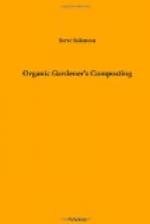When I give lectures, I am confronted by the amazing gardening variations that humans are capable of. Some folks’ raised vegetable beds are crude low mounds. Then, I am shown photographs of squared, paralleled vertical-walled raised beds, uniformly wrapped in cedar planks. Some gardens are planted in fairly straight rows, some are laid-out in carefully calculated interplanted hexagonal successions and some are a wild scattering of catch-as-catch-can. Some people don’t eat many kinds of vegetables yet grow large stands of corn and beans for canning or freezing.
Others grow small patches of a great many species, creating a year-round gourmet produce stand for their personal enjoyment. Some gardeners grow English-style floral displays occupying every square inch of their yards and offering a constant succession of color and texture.
This chapter presents some of the many different ways people handle the disposal of yard and kitchen wastes. Compost making, like gardening, reflects variations in temperament. You probably weren’t surprised at my casual landscaping because you already read about my unkempt compost heap. So I am similarly not surprised to discover backyard composting methods as neat as a German village, as aesthetic as a Japanese garden, as scientific as an engineer would design and as ugly as . . .
Containers and Other Similar Methods
In my days of youthful indiscretions I thought I could improve life on Earth by civilizing high school youth through engendering in them an understanding of history. I confess I almost completely failed and gave up teaching after a few years. However, I personally learned a great deal about history and the telling of history. I read many old journals, diaries, and travel accounts. From some of these documents I gained little while other accounts introduced me to unique individuals who assisted me in understanding their era.
It seems that what differentiates good from bad reporting is how frank and honest the reporter is about their own personal opinions, prejudices, and outlooks. The more open and direct the reporter, the better the reader can discount inevitable distortions and get a picture of what might really have been there. The more the reporter attempts to be “objective” by hiding their viewpoints, the less valuable their information.
That is why before discussing those manufactured aids to composting that can make a consumer of you, I want to inform you that I am a frugal person who shuns unnecessary expenditure. I maintain what seems to me to be a perfect justification for my stinginess: I prefer relative unemployment. Whenever I want to buy something it has become my habit first to ask myself if the desired object could possibly bring me as much pleasure as knowing that I don’t have to get up and go to work the next morning. Usually I decide to save the money so I do not have to earn more. En extremis, I repeat the old Yankee marching chant like a mantra: Make do! Wear it out! When it is gone, do without! Bum, Bum! Bum bi Dum! Bum bi di Dum, Bum bi Dum!




